(Chinhphu.vn) – On the evening of January 17 local time, in Davos, Switzerland, Prime Minister Pham Minh Chinh chaired the discussion “Potential and investment opportunities in Vietnam’s financial market”.
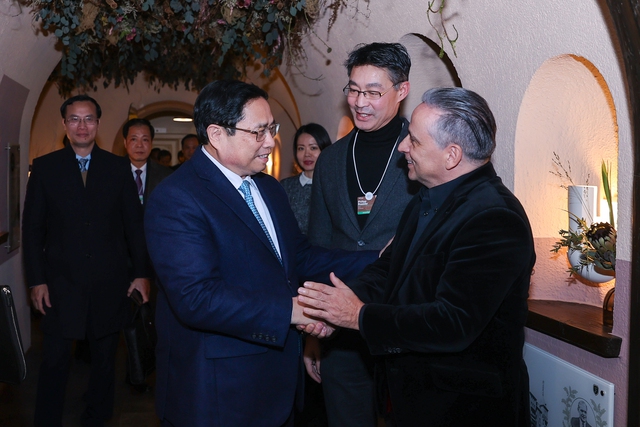 On the evening of January 17 local time, Prime Minister Pham Minh Chinh chaired the discussion “Potential and investment opportunities in Vietnam’s financial market” – Photo: VGP/Nhat Bac
On the evening of January 17 local time, Prime Minister Pham Minh Chinh chaired the discussion “Potential and investment opportunities in Vietnam’s financial market” – Photo: VGP/Nhat BacThe event was organized by the Ministry of Planning and Investment, the Swiss Banking Association, VinaCapital Investment Fund and CT Group. This is one of the important events during the Prime Minister’s business trip to Switzerland, because this country with a small area and population is one of the largest financial centers in the world.
Attending the discussion were Minister of Planning and Investment Nguyen Chi Dung; Minister of Foreign Affairs Bui Thanh Son; Minister of Industry and Trade Nguyen Hong Dien; Minister of Science and Technology Huynh Thanh Dat; Minister of Education and Training Nguyen Kim Son; Governor of the State Bank of Vietnam Nguyen Thi Hong; Chairman of Ho Chi Minh City People’s Committee Phan Van Mai; leaders of a number of ministries, branches and localities.
In particular, the discussion was attended by many experts and leaders of large financial corporations such as: Former Swedish Prime Minister Carl Bildt; former Deputy Prime Minister of Germany, Dr. Philipp Rösler; President of the Swiss Association of Banks and Asset Managers (VAV) Pascal Gentinetta; Marcus Wallenberg, Chairman of SEB Bank Group, the largest Nordic bank; Vice President of the Swiss Stock Exchange Soren Mose; Leaders of UBS Bank, Switzerland’s largest bank, Blackrock Switzerland (Switzerland’s No. 1 asset manager), Standard Chartered, Commerzbank Switzerland (Switzerland’s leading bank), HSBC Asia Pacific, Hyosung Group (Korea)…
Dr. Philipp Rösler commented that Vietnam is one of the fastest developing countries in the world in recent years, but this is just the beginning and countries are looking towards Vietnam – Photo: VGP/Japan North
Countries are looking towards Vietnam
Speaking at the opening of the discussion, Dr. Philipp Rösler commented that Vietnam has been one of the fastest growing countries in the world in recent years, but this is just the beginning and countries are looking towards Vietnam. Male.
With the assessment that Vietnam is on the way to becoming a financial center and can completely make a leap in this field, representatives of corporations and banks expressed their impression of Vietnam’s achievements after modern times. COVID-19 epidemic; Focusing on analysis of Vietnam’s potential and advantages, models and experiences in building international financial centers – recommendations for Vietnam, conditions and foundations to build financial centers and attract investment, such as legal conditions, tax policy, electricity infrastructure, information technology, transportation, skilled labor, macroeconomic stability…
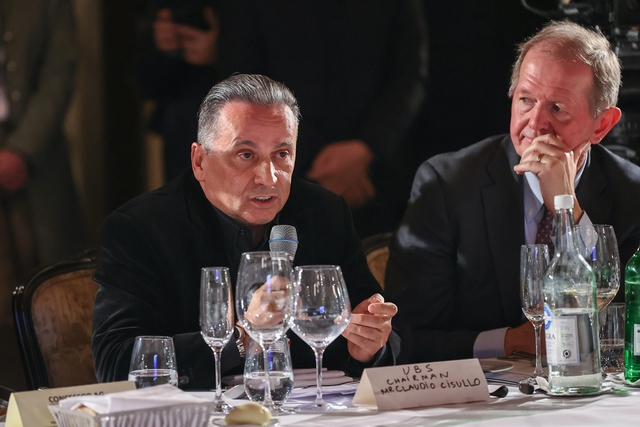 Mr. Claudio Cisullo, representative of UBS Bank, said that Vietnam is one of the countries with very good conditions to develop a financial center – Photo: VGP/Nhat Bac
Mr. Claudio Cisullo, representative of UBS Bank, said that Vietnam is one of the countries with very good conditions to develop a financial center – Photo: VGP/Nhat BacMr. Claudio Cisullo, representative of UBS Bank, said that Vietnam is one of the countries with very good conditions to develop a financial center, and also has a very special opportunity to transform itself thanks to technology and can avoid learn about the “mistakes” and wrong choices of previous countries.
Mr. Cho Hyun-sang, Vice President of Hyosung, said many Korean companies want to be present in Vietnam. With a revenue of 25 billion USD per year, this group has currently invested 3.5 billion USD in Vietnam and has about 9,000 Vietnamese employees.
Assessing the investment in Vietnam as one of the most reasonable and effective investments, Hyosung plans to increase investment capital in Vietnam to 5.5 billion USD by 2024.
He assessed that Vietnam’s strengths are the strong and effective leadership and administration of the Central government, the active support of local governments, and the hard-working and serious spirit of Vietnamese people.
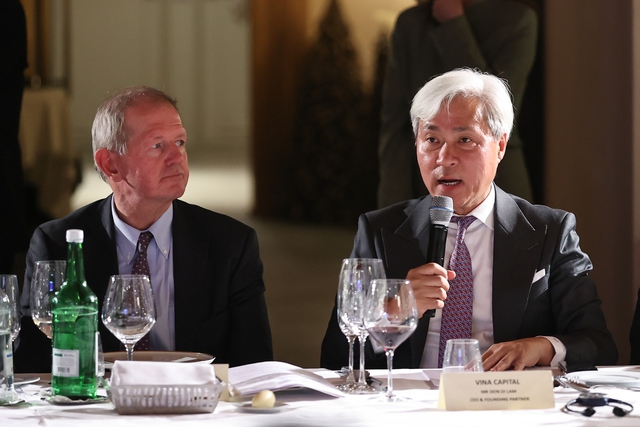 Mr. Don Lam, General Director of VinaCapital, said there are currently 200 YPO member businesses interested in Vietnam in very diverse fields. Photo: VGP/Nhat Bac
Mr. Don Lam, General Director of VinaCapital, said there are currently 200 YPO member businesses interested in Vietnam in very diverse fields. Photo: VGP/Nhat BacMr. Don Lam, General Director of VinaCapital, said that the Young Global Business Leaders Organization (YPO) decided immediately after the discussion with the Prime Minister to organize a business delegation to Vietnam (expected in February). 2025). There are currently 200 YPO member businesses interested in Vietnam in very diverse fields.
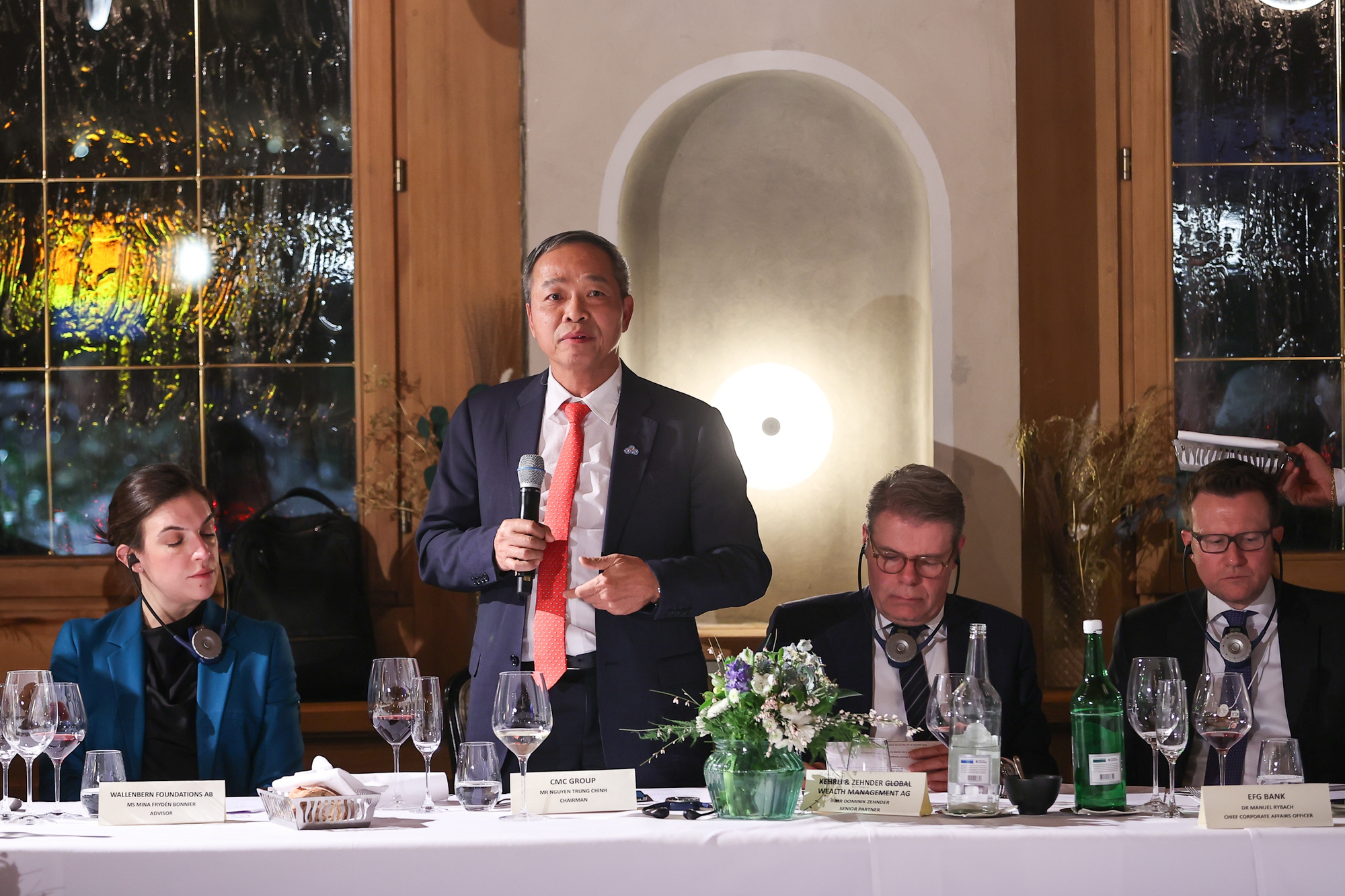
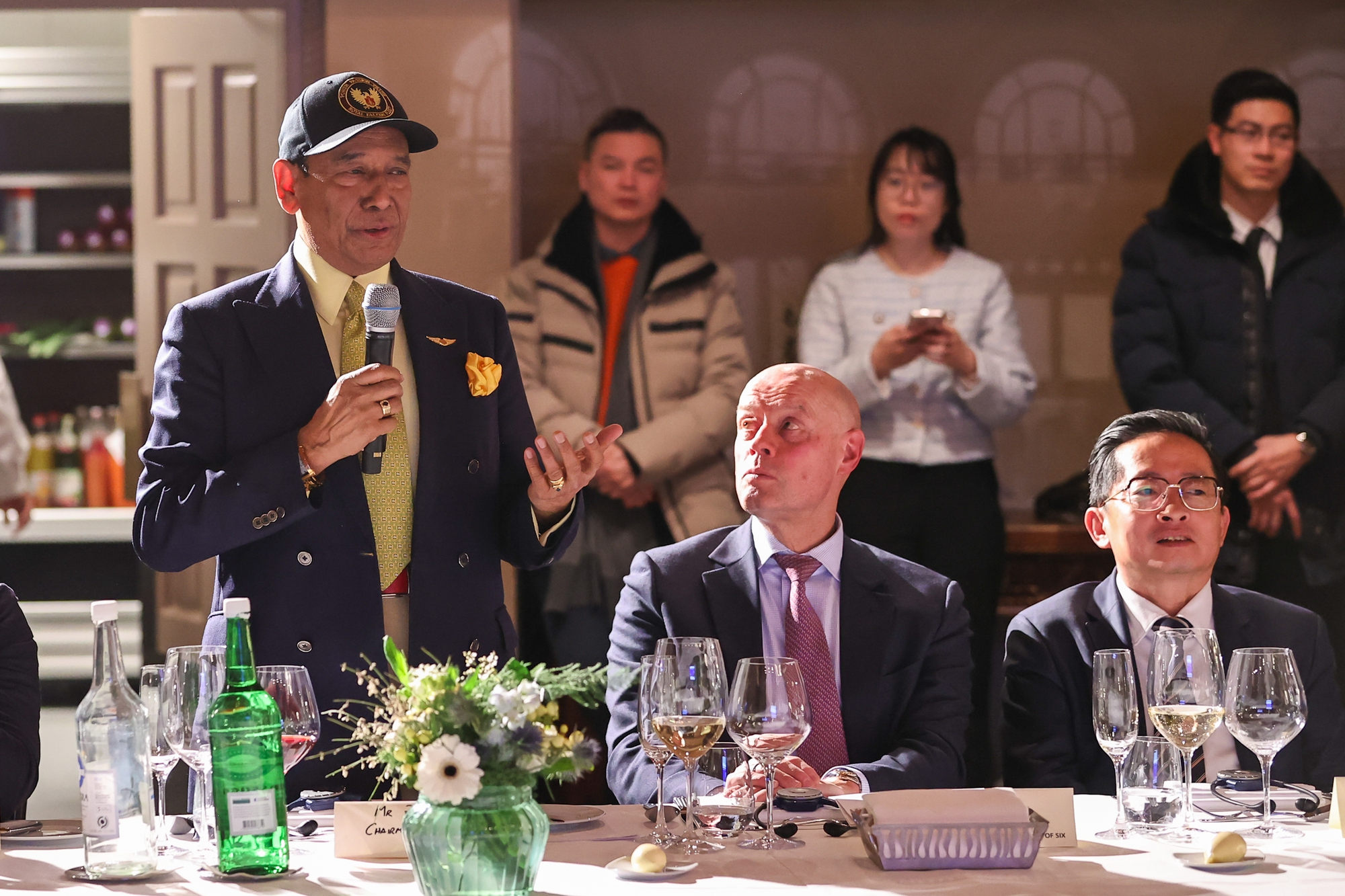
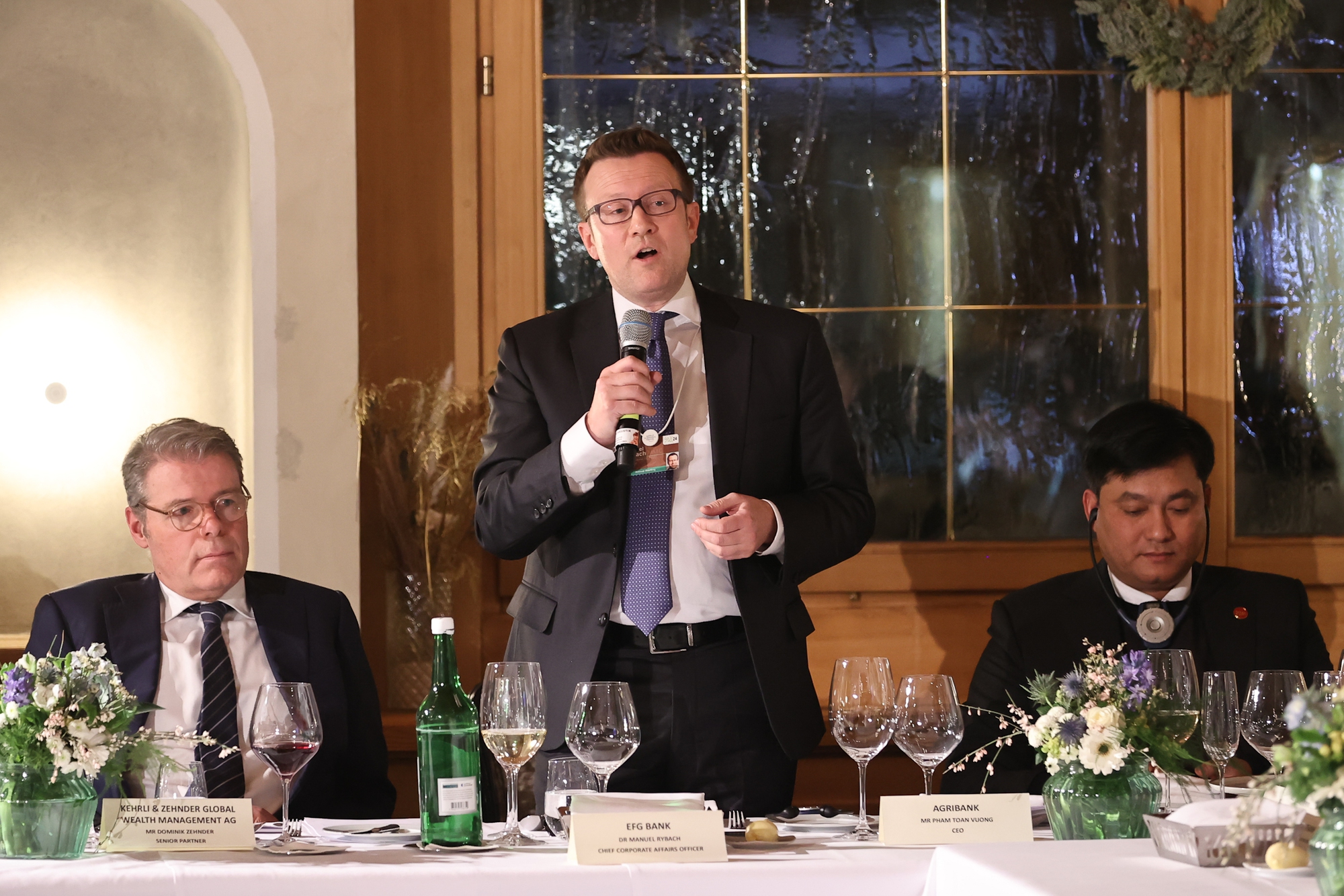 Delegates also asked many questions to learn about the regulations and policies of the Vietnamese side – Photo: VGP/Nhat Bac
Delegates also asked many questions to learn about the regulations and policies of the Vietnamese side – Photo: VGP/Nhat BacAccording to leaders of ministries, branches and Ho Chi Minh City at the discussion, Vietnam is considered by international organizations to be a potential financial center, converging many factors to develop the current financial market. modern, aiming to form a highly interconnected financial center.
These factors include macroeconomic and political stability; favorable geographical location, high connectivity; Having a different time zone from the 21 largest financial centers in the world associated with a strategic geo-economic location, this is a unique and special advantage in attracting idle capital flows during trading breaks from other countries. this center.
Along with that, institutions, mechanisms and policies are perfected; Administrative procedures and business regulations are reduced; The business investment environment is improved; Start-up innovation is strongly promoted. The scale of the economy and the level of development of the financial market are increasingly increasing.
Vietnam is gradually completing the legal framework, promoting restructuring and building strategies to develop financial markets (banking, insurance, securities). Since then, it has attracted the attention of many investors, especially foreign investors participating in the financial market.
Delegates also asked many questions to learn about Vietnam’s regulations and policies related to the capital ownership ratio of foreign investors with credit institutions, human resource training, and talent attraction., roadmap to open the financial market with retail companies, plan to implement the Political Declaration on the Fair Energy Transition Partnership (JETP)…
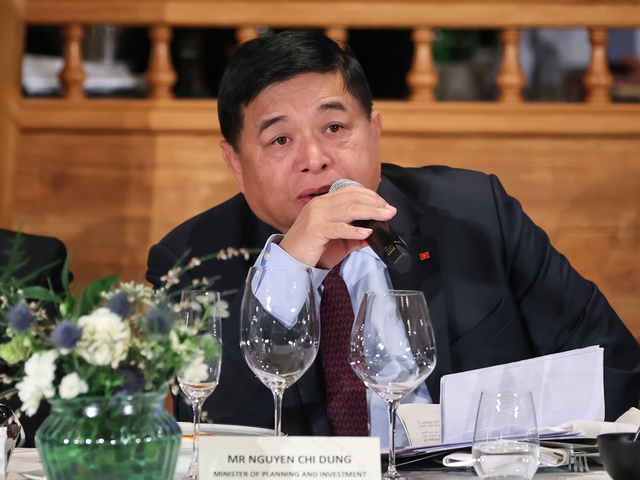
Minister of Planning and Investment Nguyen Chi Dung said that Vietnam urgently needs advice, initiatives and companionship from large financial institutions on building a financial center in Ho Chi Minh City.
Chairman of Ho Chi Minh City People’s Committee Phan Van Mai said that according to the plan, by 2030, the City will form a regional financial center and this year must submit to the National Assembly a legal framework for this center and continue to do so. update, supplement.
The city will also continue to improve infrastructure, especially in District 1 and Thu Thiem areas; train and attract high-quality human resources to meet the requirements of an international financial center.
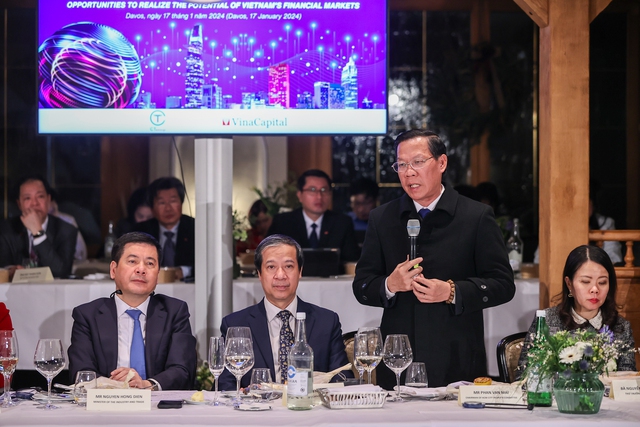 Chairman of Ho Chi Minh City People’s Committee Phan Van Mai said that according to the plan, by 2030, the City will form a regional financial center – Photo: VGP/Nhat Bac
Chairman of Ho Chi Minh City People’s Committee Phan Van Mai said that according to the plan, by 2030, the City will form a regional financial center – Photo: VGP/Nhat BacResponding to delegates’ concerns about the ownership ratio of foreign investors, SBV Governor Nguyen Thi Hong said that according to current regulations, the share ownership ratio of a foreign individual cannot exceed 5 shares. % of charter capital of a Vietnamese credit institution. This ratio for a foreign organization does not exceed 15%, for a foreign strategic investor it does not exceed 20%. Total share ownership by foreign investors does not exceed 30% of charter capital.
However, in special cases, in order to restructure weak and difficult credit institutions and ensure the safety of the credit institution system, the Prime Minister shall decide on the share ownership ratio of the credit institution. foreign investment on a case-by-case basis.
However, according to the Governor, in reality, foreign investors currently only own about 15% of charter capital in some banks, which is far from the prescribed limit.
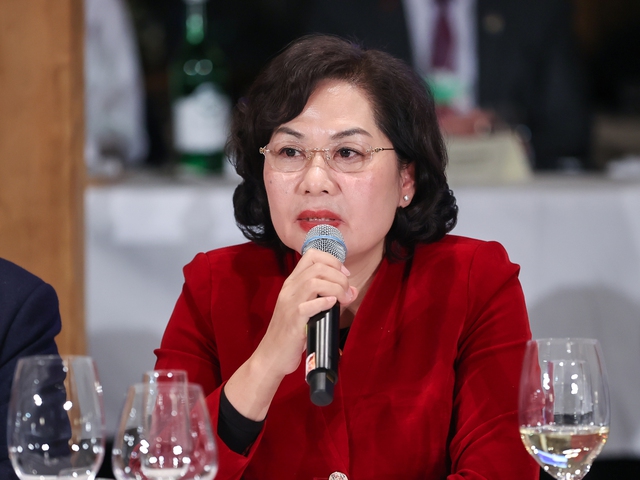 Governor of the State Bank of Vietnam Nguyen Thi Hong spoke at the seminar – Photo: VGP/Nhat Bac
Governor of the State Bank of Vietnam Nguyen Thi Hong spoke at the seminar – Photo: VGP/Nhat BacVietnam skillfully combines major policies
After leaders of ministries, branches and localities responded to the delegates’ opinions and concluded the discussion, Prime Minister Pham Minh Chinh acknowledged, thanked and agreed with ministries, branches and representatives of leading banks and financial investment funds in the world on the establishment of a research and consulting working group to build a financial center in Vietnam led by Dr. Philipp Rösler, Minister of Planning and Investment Nguyen Chi Dung, Chairman of Ho Chi Minh City People’s Committee Phan Van Mai presided.
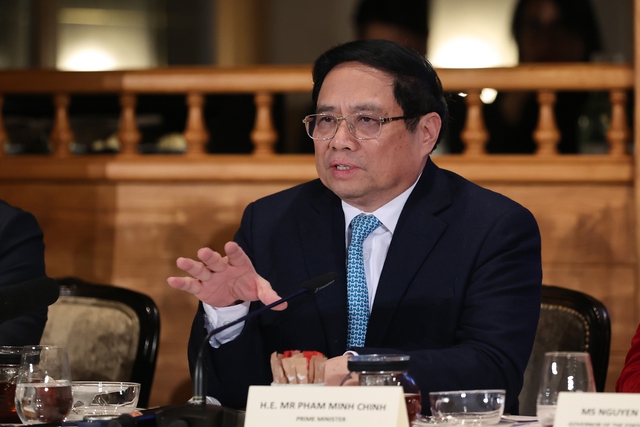 Prime Minister Pham Minh Chinh hopes that global corporations and investment funds will share experiences and advise on choosing appropriate development models and solutions to develop a financial center in Vietnam – Photo: VGP/Japan North
Prime Minister Pham Minh Chinh hopes that global corporations and investment funds will share experiences and advise on choosing appropriate development models and solutions to develop a financial center in Vietnam – Photo: VGP/Japan NorthThe Prime Minister informed delegates about the process of gaining independence, the country’s development path and the situation of Vietnam after nearly 40 years of reform, while reviewing some outstanding achievements and results. In particular, cumulatively by the end of 2023, Vietnam has attracted a total registered FDI capital of more than 468 billion USD, disbursed about 300 billion USD. In 2023, people and economic organizations deposit about 13.5 million billion VND in banks, the highest ever, showing improved income and people’s confidence.
The Prime Minister said that mobilizing all resources, developing rapidly and sustainably on the basis of science, technology, innovation and digital transformation, Vietnam aims to strive to become a developing country by 2030. develop a modern industry and high average income; By 2045, it will become a developed, high-income country.
In particular, Vietnam is focusing on sustainable development based on three pillars: Socialist democracy, socialist rule of law state and socialist-oriented market economy. Throughout that process, do not sacrifice progress, social justice and the environment in exchange for simple economic growth; Putting people at the center, the subject, is the most important goal for all development policies.
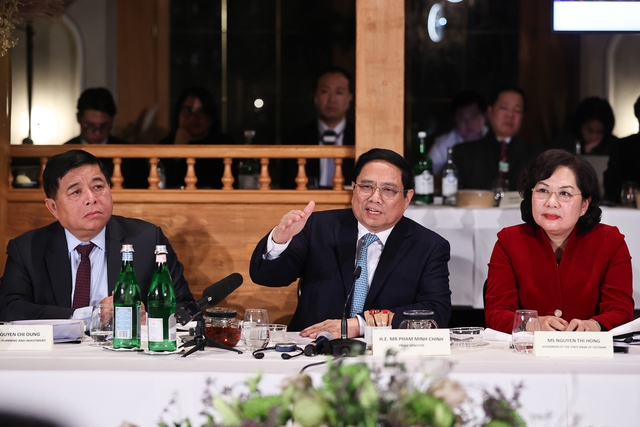 The Head of the Vietnamese Government affirmed that the Vietnamese Government always accompanies and creates favorable conditions for foreign investors in general and Swiss investors in particular to invest and do business effectively and sustainably. sustainability in Vietnam – Photo: VGP/Nhat Bac
The Head of the Vietnamese Government affirmed that the Vietnamese Government always accompanies and creates favorable conditions for foreign investors in general and Swiss investors in particular to invest and do business effectively and sustainably. sustainability in Vietnam – Photo: VGP/Nhat BacAlong with that, Vietnam implements a foreign policy of independence, self-reliance, diversification, multilateralization, being a good friend, a reliable partner and a responsible member of the international community; implementing the “4 No’s” defense policy; building a progressive culture imbued with national identity, because “if culture exists, the nation will survive”, “culture lights the way for the nation”.
Currently, Vietnam is implementing 3 strategic breakthroughs including: Building and perfecting institutions and laws; reforming administrative procedures, training high-quality human resources; Developing strategic infrastructure, especially transportation infrastructure, with the motto “open policies, smooth infrastructure, smart management”.
With the view that “resources originate from thinking, motivation originates from innovation, strength originates from the people”, Vietnam is renewing the old driving forces of “export, consumption and investment”. and adding new driving forces such as digital economy, green economy, circular economy, sharing economy, knowledge economy.
Another highlight is that Vietnam is stepping up the fight against corruption and negativity, and Vietnam’s efforts and strong determination to fight corruption have been recognized on international rankings.
“Vietnam smoothly combines major policies to create an environment of peace, political stability, social order and safety, creating conditions for investors to operate effectively, sustainably, and long-term” , the Prime Minister said.
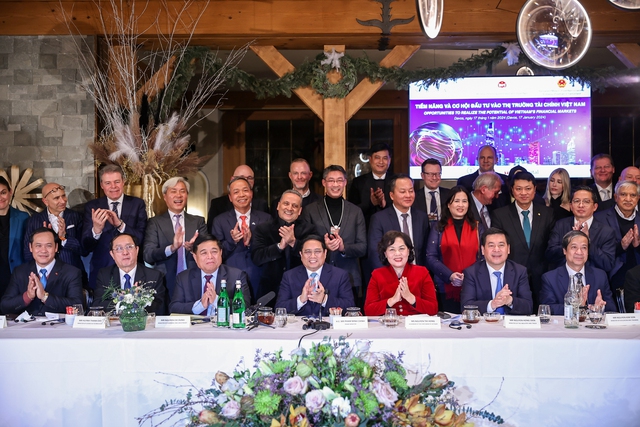 Prime Minister and delegates attending the discussion – Photo: VGP/Nhat Bac
Prime Minister and delegates attending the discussion – Photo: VGP/Nhat BacThe Prime Minister requested experts, banks, and financial investment funds to support Vietnam with policy advice; promote entrepreneurship and innovation; restructuring of banks; build and enhance national brand value; support infrastructure development; human resource training…
Prime Minister Pham Minh Chinh hopes that global corporations and investment funds will share experiences and advise on choosing appropriate development models and solutions to develop a financial center in Vietnam and develop an ecosystem. finance, improving national credit ratings, enhancing standards of accounting, auditing, and financial reporting, creating an important foundation for the successful development of an international financial center in the coming time.
Along with that, research the possibility of investing in and restructuring weak banks in Vietnam; Accompany and support Vietnam in training and developing high-quality human resources for the financial services sector, meeting standards and in accordance with the needs of the global market.
The Head of the Vietnamese Government affirmed that the Vietnamese Government always accompanies and creates favorable conditions for foreign investors in general and Swiss investors in particular to invest and do business effectively and sustainably. firmly in Vietnam.
The Government will promote its constructive role, always accompanying, sharing, listening, and absorbing opinions of businesses and investors for mutual development; Committed to protecting the legal and legitimate rights and interests of investors under any circumstances, not criminalizing economic relations; in the spirit of “harmonious benefits, shared risks”, “harmony of interests between the State, people and businesses”.
The Government will also continue to review mechanisms, policies, and legal tools to promote prevention of corruption and negativity, reform and reduce administrative procedures, create a fair, open, and healthy playing field. strong and minimize input costs, compliance costs for investors, increase competitiveness of products and services.
Source: Ha Van – BAO DIEN TU CHINH PHU

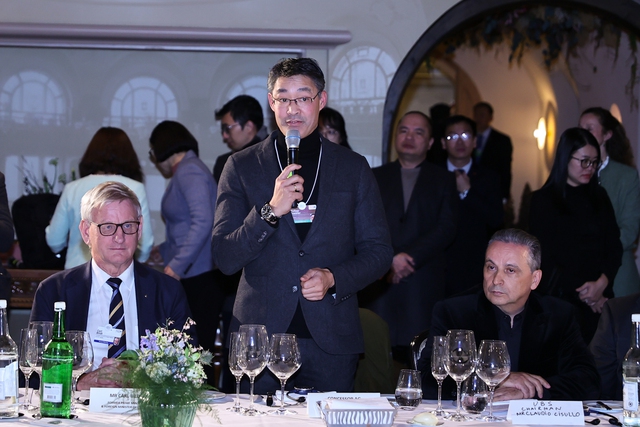
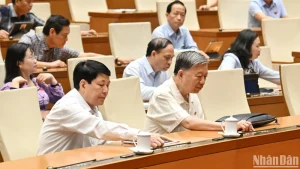
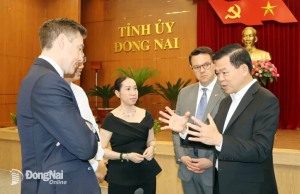

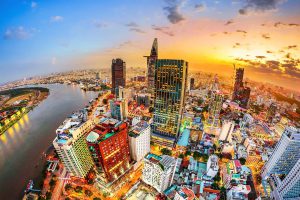
Leave a reply